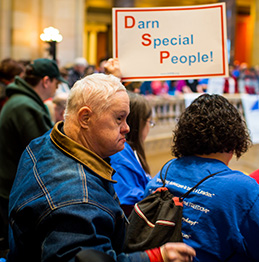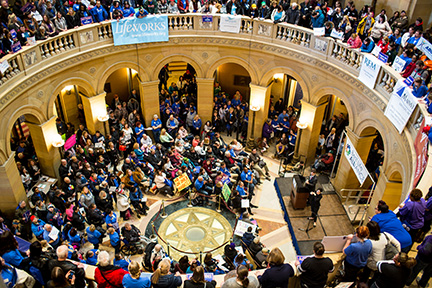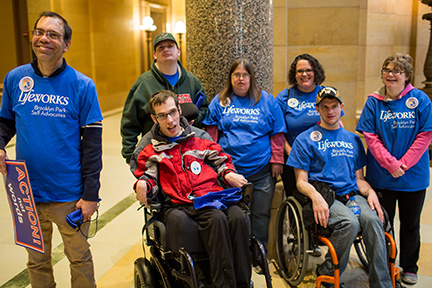
In Minnesota today, there are more than 8,700 unfilled direct care jobs in disability services.
And the workforce shortage is only getting worse. With wages averaging just $12.32 per hour – and many earning less – finding and retaining staff for demanding, highly-skilled positions is a challenge for providers like Lifeworks across the state.
Because wages for direct care workers are directly tied to state reimbursement rates set by lawmakers, Lifeworks self-advocates are doing their part to make this critical need known at the state Capitol.
On March 14, Lifeworks was well-represented at the Day at the Capitol rally co-hosted by ARRM, a nonprofit association of more than 200 providers, businesses, and advocates, and MOHR, a disability services membership organization focused on advocacy and support.
The Lifeworks group joined an estimated crowd of 1,000 in the packed Capitol rotunda to hear from nonprofit leaders and lawmakers from both sides of the aisle.
“We have constitutionally protected funding for roads and bridges, we have constitutionally protected funding for parks and trails, we have constitutionally protected funding for public broadcasting, but we have nothing for our most vulnerable citizens,” said Sen. Kent Eken, DFL-Twin Valley. “I will keep fighting, because you deserve it!”
Throughout the hour-long rally, cheers and chants of “4 percent!” could be heard, referencing the Best Life Alliance bill (SF 669 and HF 873) that, if passed, will provide consecutive 4 percent wage increases for more than 80,000 direct care workers statewide and develop a long-term solution for funding health insurance for direct care workers by July 2019.

An estimated crowd of 1,000 rallied in support of wage increases for direct care workers during the ARRM/MOHR Day at the Capitol on March 14.
This year’s bill comes on the heels of an unsuccessful attempt to pass similar legislation in 2016, despite a majority of legislators in both parties serving as co-authors. The last time a bill of this kind was successfully passed was 2014.
With a projected budget surplus of $1.4 billion, 2017 provides a unique opportunity to support people with disabilities and the staff members who care for them.
“Thanks to all of you who represent the best in Minnesota,” said Rep. Matt Dean, R-Dellwood. “We have a state with a big heart and we show that by the way we take care of each other.”
Following the rally, advocates shifted their focus to the Health and Human Services Finance Committee of the House of Representatives to witness a discussion of the Best Life Alliance bill, which was approved to be considered for the overall budget.
More than 160 rally participants also scheduled appointments to meet with legislators to further discuss the workforce shortage and the needs of the disability community.
Among those in attendance at the Capitol were the members of the Lifeworks Brooklyn Park self-advocacy group. The group, led by staff member Lori Noland, has earned a strong reputation as active participants during the legislative session.
“It’s important for people with disabilities to have the care that they need and it’s so important to help these guys advocate for themselves,” Noland said.
For the past three years, Noland has taught self-advocacy classes in Brooklyn Park and accompanied the group to St. Paul on Tuesdays so they can participate in advocacy efforts, meet with legislators, and make their voices heard.

The Lifeworks Brooklyn Park self-advocacy group regularly visits the Capitol.
“It’s very empowering to be able to educate them on what their choices are,” Noland said. “I know one of our guys, his parents told me that he never really wanted to watch the news before, and after we started talking about this stuff in class, he actually wanted to talk about it at home and watch the news.”
In addition to being regulars at the Capitol, the group periodically invites legislators to visit them in Brooklyn Park, tour the Lifeworks facility, and speak with them about their needs and concerns.
Their effort over the years hasn’t gone unnoticed. Even among a boisterous crowd at the Capitol, Rep. Dennis Smith recognized self-advocate Jacob Johnson as he walked by in the hall.
Erik Fearing, whose legislators also know him by name, received support from Sen. Jim Abeler after his wheelchair was stolen from the hallway of his apartment in Anoka last year.
“He has a walker that he can use, but it started injuring his knee because he was walking everywhere,” Noland said. “It was taking a really long time [to get a replacement] – the back and forth that they had to do – and it was several months.”
After Erik and Lori sent Sen. Abeler an email explaining the situation, he replied back that same day offering his help. A couple of days later, Erik’s mom got a phone call with tips to speed up the process, and he quickly received a chair to use until his new one arrived.
“It’s forming those relationships and educating the legislators, because they don’t always know,” Noland said. “Maybe they’ve never been to a day program; maybe they don’t know anybody that has a disability. And if they don’t know, then they don’t know what they’re voting for and against. It’s making these guys real to them.”
While the legislature continues to deliberate the Best Life Alliance bill and the forthcoming state budget, self-advocates are doing their part to ensure much-needed wage increases come to the people who are there for them every day.
